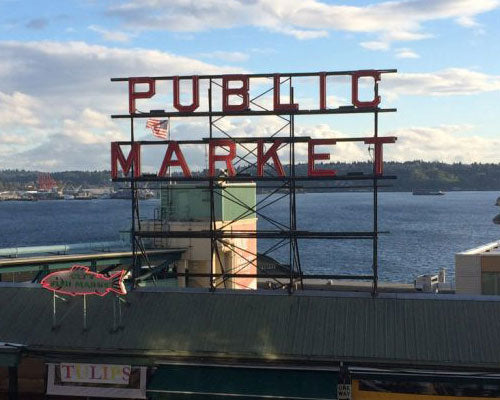Last month we had the privilege of attending the Specialty Coffee Association Expo in Seattle, WA. The event is a great mix of coffee roasters, retailers, producers, importers, equipment manufacturers, and other industry partners, and we’ve always found great value in the sharing of knowledge and innovation that takes place at the event.
Our Head Roaster, Eric Stone, competed again this year in the United States Roasters’ Championship. He finished 5th overall with fantastic coffee and presentation scores, and we could not be more proud to have him represent our company and efforts. If you would like to learn more about the competitions, you should check out our blog post about the qualifying round of the USRC. Naturally the competition preparation and participation uses up a healthy portion of our time while at the event, but we still found time to do some other very cool things too!
One highlight for me was meeting and cupping with one of our favorite producers, Luiz Roberto Saldanha from Capricornio Coffee in Brazil. Capricornio specializes in exporting unique Brazilian coffees from the regions surrounding the Tropic of Capricorn. Because the latitude is right on the edge of what we call the “coffee belt," the temperatures are cool enough to grow exceptional coffees at unusually low altitudes, many below 800 meters above sea level.
The rare combination of cool temperature and low altitude makes for very unique coffees with slow cherry maturation and low density beans. This creates a fun challenge for us as roasters. Luiz is also doing a lot of work with experimental processing methods, and they are showing some really promising results. Working with people like him, who are pushing the envelope, really makes this whole crazy adventure special.
I also got to attend a lecture on coffee farm profitability led by a panel of researchers and importers. We learned key differences between large- and small-holder farmers, namely how implementing “best” agricultural practices can often lead to a lack of profitability for the latter. As a roaster, it’s easy for me talk about agricultural practices as if they’re feasible for everyone, but the truth is that smaller farmers cannot sustain best practices if they cannot make a profit. Until the market begins to value small-coffee-farm products more, it is difficult for small producers to survive. This is one of the reasons we believe so strongly in super specialty coffees like Geishas/Geshas. Because of their value perception, they have the potential to be game changers for small farms.
Finally, just being in such an awesome city as Seattle is a highlight in and of itself. The views of Puget Sound and the mountains, the food, the drink, the coffee-- it’s a pretty cool place.
--Phil






